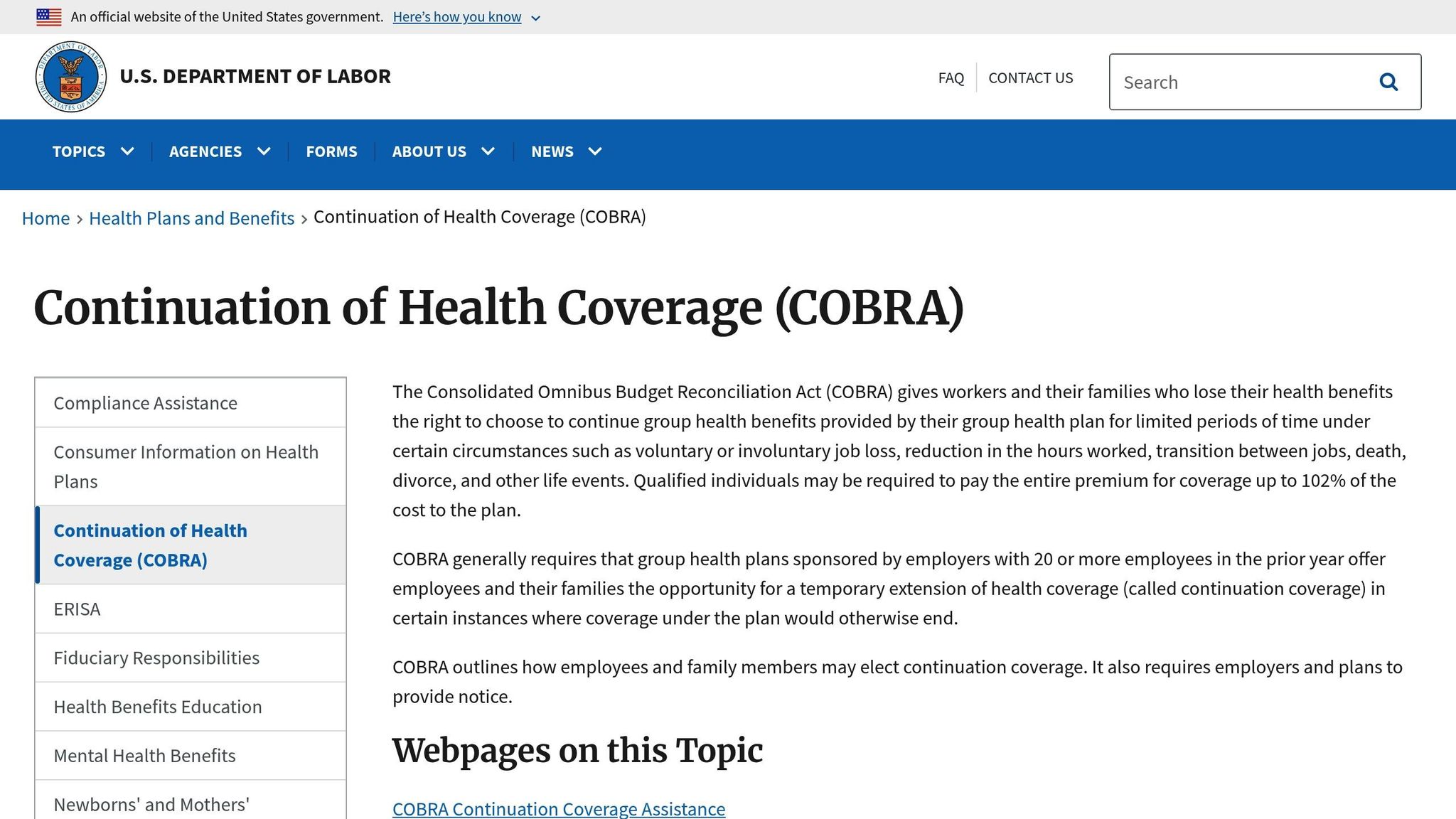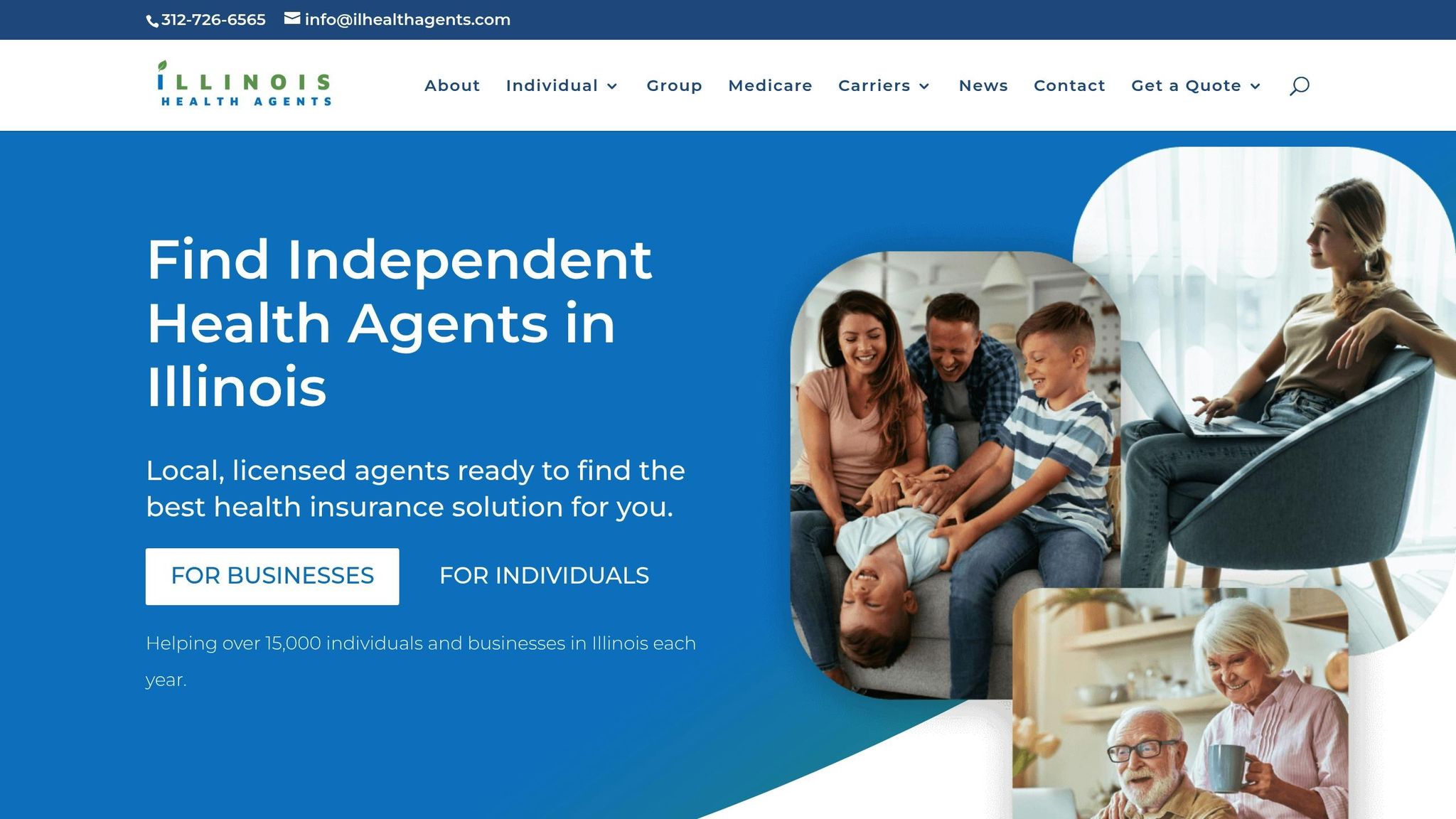Short-term health insurance in Illinois is a temporary solution for those in transition, like between jobs or waiting for other coverage. These plans are affordable but come with significant limitations. Here’s what you need to know:
- Duration: Coverage lasts 30 days to 12 months.
- Cost: Lower premiums but limited benefits.
- Exclusions: No coverage for pre-existing conditions, maternity care, or preventive services.
- Quick Enrollment: Fast approval but subject to medical underwriting.
Key Updates (2023-2025): Illinois is tightening rules on short-term plans, reducing their duration and renewability. Residents should explore ACA plans, Medicaid, or COBRA for more comprehensive, long-term options.
Quick Comparison:
| Feature | Short-Term Plans | ACA Plans |
|---|---|---|
| Duration | Up to 12 months | Year-round |
| Pre-existing Conditions | Not covered | Fully covered |
| Premiums | Lower | Higher (subsidies available) |
| Essential Benefits | Limited | Comprehensive |
For temporary needs, short-term plans may work, but ACA options offer better long-term coverage and financial assistance. Always compare plans and consult a licensed agent to make the best decision for your needs.
Short Term Health Insurance Plans – What You Need To Know
Short-Term Health Insurance Basics
Short-term health insurance provides temporary coverage for Illinois residents during transitional periods. These plans are designed to help manage unexpected medical costs while you sort out long-term insurance. Let’s break down what these plans offer and their limitations.
Key Features
Short-term health insurance in Illinois includes several important aspects:
- Coverage Duration: These plans are temporary, lasting anywhere from a few weeks to several months.
- Lower Premiums: Costs are generally lower because the benefits are limited.
- Quick Enrollment: Applications are processed quickly, often with same-day approval.
- Provider Flexibility: Provider options vary depending on the insurance carrier.
Illinois Health Agents works with carriers rated A– or higher, ensuring policyholders receive coverage from financially stable providers.
Plan Limits and Exclusions
It’s important to understand the limitations of these plans:
- Pre-existing Conditions: Most policies exclude pre-existing conditions, though some may cover conditions that arise after enrollment.
- Preventive Care: Routine check-ups and screenings are generally not covered, aside from some diagnostic tests for injuries.
- Prescription Medications: Coverage is limited to prescriptions for new illnesses; ongoing maintenance medications aren’t included.
- Maternity Care: Pregnancy and childbirth services are excluded, with only limited coverage for complications.
Other exclusions include dental and vision care (unless related to an injury), mental health services, substance abuse treatment, alternative therapies, and chronic condition management.
These plans require medical underwriting, come with annual and lifetime benefit limits, and typically cannot be renewed. Since they don’t meet ACA standards, understanding these details is essential before comparing them to ACA-compliant options.
Illinois Law Changes (2023-2025)
Illinois is introducing updates to short-term health insurance regulations aimed at strengthening consumer protections and expanding coverage options.
New Rules Timeline
State officials have announced phased updates that will shorten the duration of short-term plans and limit their renewability. While exact dates are not yet finalized, these changes will soon affect available insurance options.
Effects on Illinois Residents
Here’s how these updates may impact residents:
Current Policy Status
- If you already have a short-term policy, it will stay in effect under its original terms until it expires.
- Renewals might be restricted or unavailable once your current coverage ends.
Considering Coverage Transitions
- This is a good time to reassess your insurance needs and explore more comprehensive plans.
- Special enrollment periods will be available for those moving away from short-term plans.
Financial Considerations
- While alternative plans may come with higher monthly premiums, they typically include broader benefits.
- Programs through the ACA marketplace, like income-based subsidies and cost-sharing reductions, can help reduce your out-of-pocket expenses.
Staying informed about these updates will help you weigh the pros and cons of temporary versus long-term health insurance coverage.
sbb-itb-a729c26
Other Coverage Options
When short-term coverage ends, it’s time to explore broader options for more lasting and inclusive protection. With increasing restrictions on short-term plans, these alternatives can help bridge the gap while offering more extensive benefits.
ACA Health Plans
ACA plans are a solid choice, providing open enrollment periods (early November to mid-January), as well as special enrollment for qualifying life events like job loss or marriage. They come with income-based financial assistance and standardized benefits, covering essential services such as prescription drugs, maternity care, and mental health treatment. These plans also ensure coverage for pre-existing conditions and include preventive care services at no extra cost.
Medicaid and COBRA Options

For Illinois residents, Medicaid (also known as Medical Assistance) could be an option, depending on income and household size. This program provides extensive coverage with minimal out-of-pocket expenses, making it a budget-friendly choice for eligible individuals.
COBRA, on the other hand, allows you to continue your employer-sponsored health plan for up to 18 months. While COBRA premiums are often higher since you cover the full cost, it ensures uninterrupted access to your current healthcare providers and prevents coverage gaps.
Limited Benefit Plans
Limited benefit plans are designed to complement your primary insurance by offering fixed payments for specific services. These plans can help reduce out-of-pocket expenses when paired with comprehensive health coverage.
| Plan Type | Coverage Focus | Best Suited For |
|---|---|---|
| Hospital Indemnity | Pays fixed amounts for hospital stays | Those needing extra financial support |
| Critical Illness | Provides lump-sum payments for diagnoses like cancer or heart disease | Added financial protection |
| Accident Plans | Covers expenses related to injuries | Individuals wanting extra coverage for accidents |
When transitioning between plans, it’s essential to maintain continuous coverage. Consider reaching out to a licensed insurance professional to find the option that best meets your healthcare needs and fits your budget.
Short-Term vs. ACA Plans
Short-term health insurance and ACA plans differ significantly in coverage, benefits, and costs. Short-term plans are designed for temporary needs with lower premiums but offer limited benefits. In contrast, ACA plans provide year-round, comprehensive coverage, including protections for pre-existing conditions and essential health benefits. The table below breaks down the key differences.
Plan Features Chart
| Feature | Short-Term Plans | ACA Plans |
|---|---|---|
| Duration | Limited coverage periods | Year-round coverage with annual renewal |
| Pre-existing Conditions | Not covered | Must be covered |
| Essential Health Benefits | Limited coverage | Comprehensive coverage required |
| Premium Costs | Lower premiums | Higher premiums, with subsidies available |
| Enrollment Period | Anytime during the year | Annual open enrollment or qualifying events |
| Prescription Drug Coverage | Limited or not included | Must be included |
| Preventive Care | Not covered | Covered at 100% |
| Maximum Benefits | Annual or lifetime caps | No annual or lifetime limits |
| Network Requirements | Restricted networks | Broader provider networks |
| Premium Tax Credits | Not eligible | Available for qualifying individuals |
Choosing between these plans depends on your current and future healthcare needs. If you’re in a transitional phase and seeking temporary coverage, short-term plans can save you money upfront. However, they may leave you with higher out-of-pocket expenses if unexpected medical issues arise. On the other hand, ACA plans are ideal for individuals and families who need comprehensive coverage, including pediatric and maternity care, or for those eligible for premium subsidies to offset costs.
Think about both your immediate situation and long-term healthcare needs when making a decision. While ACA plans may have higher premiums for those without subsidies, they offer extensive protection and peace of mind for managing ongoing or significant medical expenses. Short-term plans, though cheaper, might not provide the coverage you need in the event of major health concerns.
Services from Illinois Health Agents

Insurance Plan Support
Illinois Health Agents offers expert assistance to Illinois residents in navigating the often-confusing world of health insurance. Their knowledgeable team works with individuals and families to find coverage options that suit their healthcare needs and fit their budgets.
They provide tailored support for:
- ACA Plan Transitions: Helping evaluate Marketplace plans and explore available subsidies.
- Short-Term Coverage: Explaining the limitations and benefits of temporary plans.
- Supplemental Insurance: Assisting with additional coverage options, like dental and vision plans.
- Medicare Solutions: Guiding those transitioning to Medicare coverage.
With accolades like the Marketplace Elite Circle of Champions and the Best of 2023 Chicago Health Insurance Agency award, Illinois Health Agents demonstrates a strong commitment to customer care and insurance expertise. Scroll down to learn more about their trusted insurance carrier partners.
Insurance Carrier Network
Illinois Health Agents collaborates with highly rated insurance providers to deliver dependable coverage. Their network includes leading companies offering a variety of plans:
| Coverage Type | Available Options |
|---|---|
| Short-Term Plans | Catastrophic coverage and temporary gap solutions |
| ACA Marketplace Plans | Individual and family coverage, often with subsidies |
| Supplemental Coverage | Vision, dental, and life insurance policies |
| Medicare Solutions | Medicare supplements and related coverage options |
| Group Health Plans | Coverage for small businesses and corporations |
As independent agents, Illinois Health Agents do not favor any single provider. This allows them to offer unbiased recommendations tailored to each client’s unique needs. Their local expertise ensures compliance with Illinois regulations, making their guidance especially relevant for residents.
Beyond plan selection, their services include regular policy reviews, claim support, and assistance during life changes that might impact insurance needs. As active members of the National Association of Health Underwriters (NAHU), they stay informed about the latest industry updates and regulatory changes to provide accurate, up-to-date advice.
Conclusion
Short-term health insurance in Illinois provides specific benefits and limitations for those needing temporary coverage. It’s essential to evaluate these plans within the context of recent regulatory updates.
Illinois Health Agents stands out for offering independent guidance and partnering with highly rated carriers to assist residents in making informed decisions. As they explain:
"Whether you are looking for long or short‐term coverage, we will help you find the best plan on your budget."
State regulations ensure standardized premiums, making it easier to compare plans. Rates set by the Illinois Department of Insurance guarantee consistency, and Illinois Health Agents can help you navigate these options to find the right fit.
When exploring your health insurance choices, keep these points in mind:
- Compare Plans: Weigh short-term insurance against Affordable Care Act options.
- Understand Restrictions: Carefully review exclusions and limitations of each plan.
- Timing Matters: Consider enrollment deadlines and when coverage begins.
- Get Expert Advice: Licensed professionals can provide tailored recommendations.




0 Comments